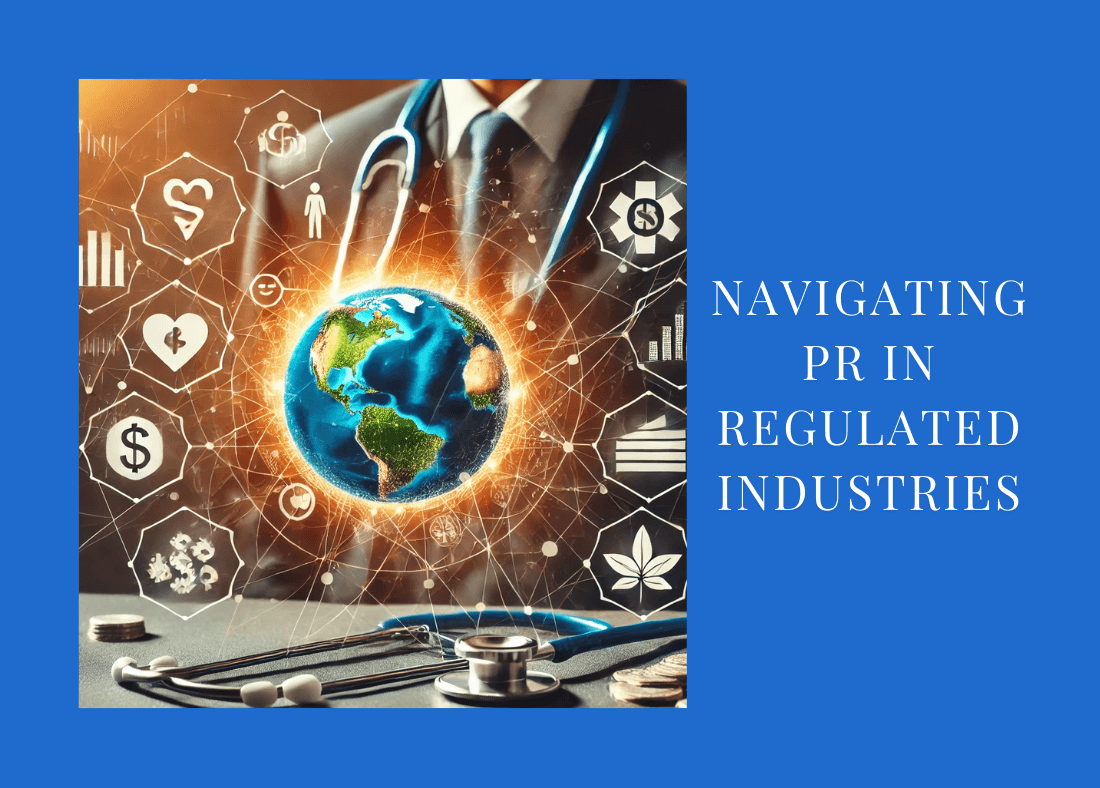Public relations (PR) plays a pivotal role in shaping a brand’s reputation, fostering trust, and ensuring effective communication with stakeholders. In regulated industries such as healthcare, finance, and energy, PR professionals must navigate strict regulations that govern how communications are crafted and delivered. These sectors face global regulatory frameworks, which can vary across regions but share common goals of transparency, accuracy, and public safety.
Understanding the Regulatory Landscape
Regulations vary from country to country, but key international bodies and standards shape how industries communicate globally. For example, in healthcare, finance, and energy, organisations must adhere to rules set by entities such as the International Financial Reporting Standards (IFRS) or follow guidelines set by the World Health Organization (WHO) and the International Energy Agency (IEA). The aim is to ensure that companies communicate transparently, adhere to ethical standards, and avoid misleading or unverified claims.
Communications must meet both regional and global standards, making it critical for PR teams to be aware of multiple layers of regulations across jurisdictions. Failing to comply with these regulations can result in heavy fines, legal repercussions, and significant damage to an organisation’s reputation.
The Challenges of Compliance and Communication
One of the main challenges for PR professionals in regulated industries is ensuring that all communications comply with relevant laws without diluting the core message. The constraints can vary significantly depending on the industry and region:
- Healthcare: Communications must align with the standards set by global bodies like WHO, as well as regional regulatory agencies, to avoid making unsubstantiated claims about medical products. The challenge is to communicate advancements and breakthroughs without exaggerating outcomes or misleading the public.
- Finance: The finance sector operates under strict transparency and reporting requirements, with organisations needing to comply with frameworks like the IFRS. Financial communications, particularly those that affect investors and markets, must be meticulously accurate to avoid regulatory breaches.
- Energy: With increasing focus on sustainability, global regulations by bodies such as the IEA and national policies on carbon emissions control must be adhered to. Communicating energy innovations, whether in traditional or renewable sectors, requires sensitivity to government regulations while promoting technological advances.
Opportunities for Thought Leadership
Despite these challenges, regulated industries offer unique opportunities for establishing credibility and thought leadership. Compliance with global standards not only protects a company but also allows PR professionals to build trust and a positive reputation in sectors where trust is critical.
- Emphasise Expertise: Leveraging technical expertise and regulatory knowledge can strengthen PR efforts. Featuring insights from subject matter experts, such as compliance officers, healthcare professionals, or energy researchers, can add depth to PR campaigns.
- Collaborate with International Bodies: Engaging directly with international regulatory bodies such as the International Monetary Fund (IMF) in finance or the International Atomic Energy Agency (IAEA) in energy helps PR teams stay ahead of upcoming regulatory changes and better align their messaging.
- Share Global Success Stories: Case studies and real-world applications of regulatory compliance across different markets provide strong content for PR campaigns. Highlighting how an organisation meets diverse regulatory demands in different regions enhances credibility and trust.
- Transparency and Sustainability: In the energy sector, global commitments to sustainability, such as those outlined by the United Nations Framework Convention on Climate Change (UNFCCC), provide a platform for PR teams to highlight an organisation’s efforts in reducing its environmental footprint. Transparent communications on progress towards sustainability goals are increasingly important in global PR strategies.
Building a Compliant and Effective PR Strategy
Navigating global regulations requires a nuanced and proactive approach to PR strategy. Here are a few steps PR teams can take to ensure success:
- Cross-Department Collaboration: Effective communication between PR, legal, and compliance teams is essential to ensure that all messaging meets regulatory standards. Joint efforts reduce the risk of miscommunication and regulatory breaches.
- Monitoring Global Regulatory Trends: PR teams must stay up to date on the constantly evolving landscape of global regulations. Changes in international standards, such as updates from the International Organization for Standardization (ISO) or Financial Action Task Force (FATF), can impact messaging strategies.
- Developing Crisis Management Plans: In regulated industries, crisis situations can emerge rapidly due to regulatory breaches or misinterpretations of regulations. Developing a robust crisis management plan that includes a focus on regulatory compliance is vital to mitigating damage.
While PR in regulated industries, including healthcare, finance, and energy, present unique challenges, however, with the right strategy, these industries also provide immense opportunities for building trust and positioning organisations as thought leaders. By staying informed, collaborating across departments, and proactively engaging with regulatory trends, PR professionals can navigate the complexities of these sectors and achieve success.



